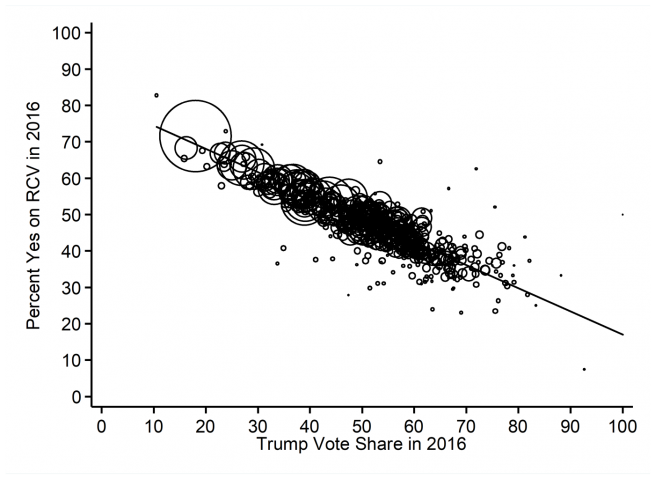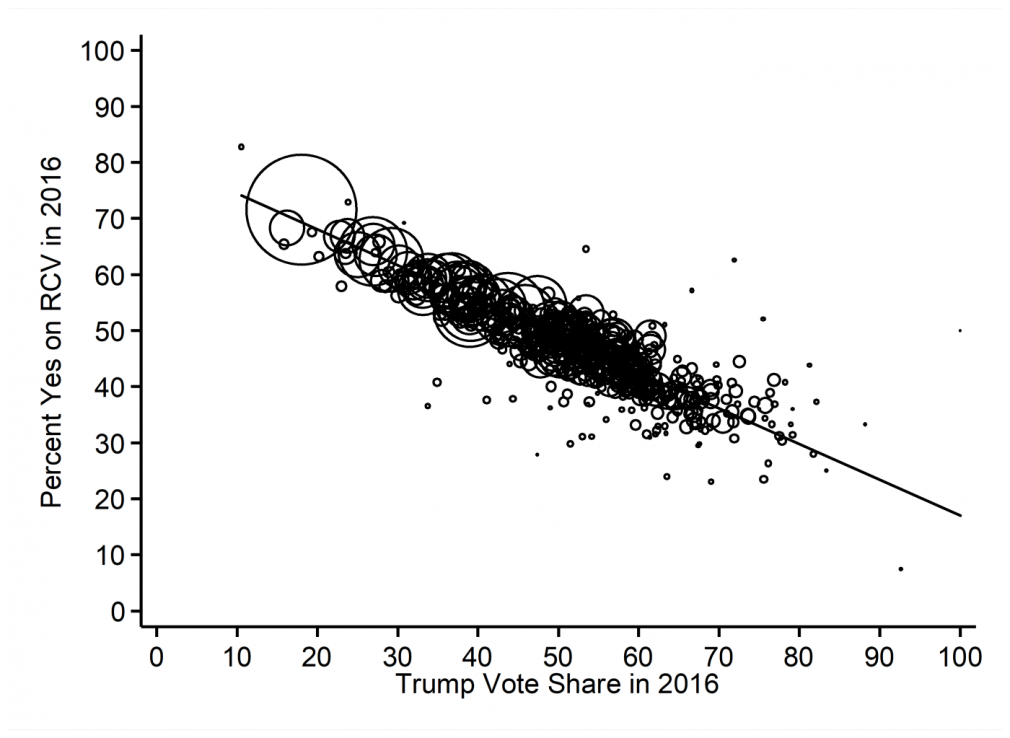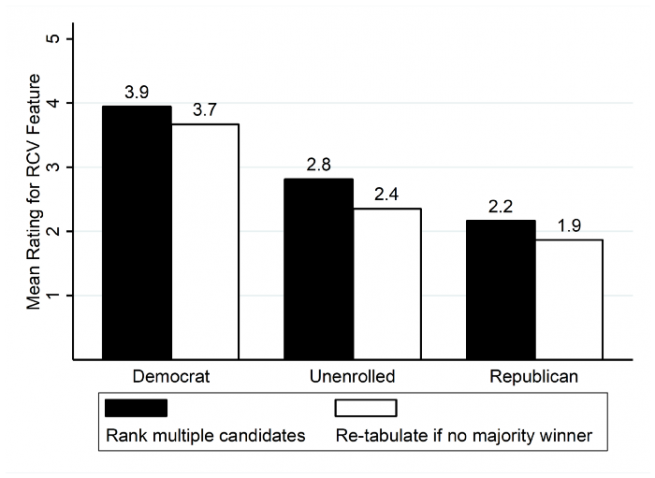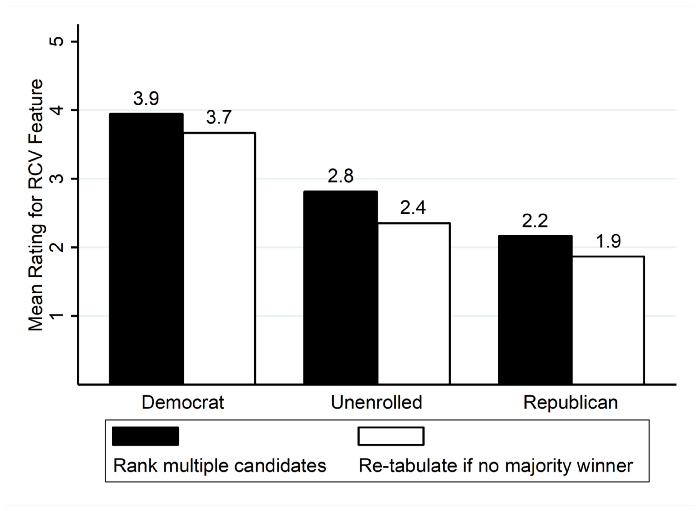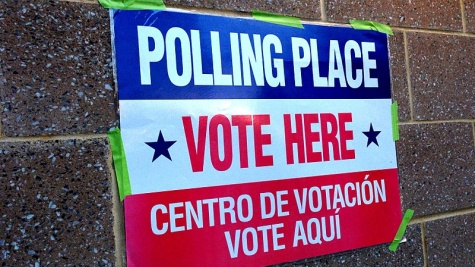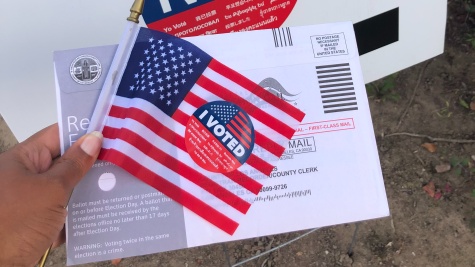Like Voters and Politicians, Maine Municipal Clerks are Split by Party on Ranked Choice Voting
The MIT Election Data and Science Lab helps highlight new research and interesting ideas in election science, and is a proud co-sponsor of the Election Sciences, Reform, & Administration Conference (ESRA).
Joseph Anthony, Amy Fried, Robert Glover and David C. Kimball recently presented a paper at the 2019 ESRA conference entitled, “Ranked Choice Voting in Maine from the Perspective of Election Authorities.” Here, they summarize their analysis from that paper.
Ranked choice voting (RCV) is an election reform that is gaining support in the United States. Most of our elections use plurality rules — voters choose one candidate, and the candidate who gets the most votes wins, even if that person receives less than a majority of votes. RCV asks voters to rank candidates in order of preference.
If no candidate has a majority when first choice votes are counted, then last-place candidates are eliminated from contention and their votes are reassigned to other remaining candidates based on the second choice preferences of those voters. This process continues until one candidate receives a majority of the available votes. Thus, RCV is designed to produce a winner preferred by a majority of voters, not just a plurality. While over a dozen cities across the United States use ranked choice voting in some fashion, in 2018 Maine became the first state to use RCV for statewide and federal elections. It is important to examine Maine’s experience with RCV as other states consider adopting this election reform.
We examine the views of Maine’s municipal clerks who administer elections in the towns where they serve. Local officials play a crucial role running elections, and the roughly 480 municipal clerks in Maine were able to observe how RCV worked in their towns. The success of any election reform depends, in part, on support from local officials who implement the new law. In addition, the views of local election officials carry some weight with policymakers and the public.
The Data
Our primary data come from a survey of municipal clerks in Maine conducted in 2019, a few months after the 2018 general election that used RCV. The survey asked clerks about their experience implementing the new RCV rules. The Maine Town and City Clerks’ Association helped us send out the survey. Roughly 90 municipal clerks completed our survey. We plan a follow-up effort to get some more clerks to answer the survey, so the results reported here are preliminary.
Our Findings
The adoption of ranked choice voting in Maine has been and remains a highly partisan issue. Democratic politicians and liberal groups were the main proponents of ranked choice voting, while the Maine Republican Party and a conservative think tank led the opposition. Maine Republicans filed several lawsuits to prevent the adoption of RCV, but the courts ruled against them. It also took the passage of two statewide ballot measures (one in 2016 and one in 2018) to ensure the adoption of RCV in Maine.
Partisan divisions over ranked choice voting in Maine can be seen in the results of the 2016 general election, when the first measure to adopt ranked choice voting (Question 5) passed. The figure below plots voter support for the RCV ballot question by Donald Trump’s share of the presidential vote in Maine’s 502 municipalities (the data symbols are sized in proportion to the number of votes cast in each jurisdiction). As the graph shows, there is a strong linear relationship between partisanship and the vote on Question 5. In the figure, voter support for ranked choice voting declines sharply as Trump’s vote share increases. Other studies find that roughly 80 percent of Democrats in Maine support RCV, while 80 percent of Republicans oppose RCV.
In this political environment, it is not a surprise that Maine municipal clerks are also divided along party lines in their views of RCV. One set of survey questions asked clerks to rate the main features of RCV as disadvantages or advantages on a scale from 1 to 5. As the next figure below indicates, Democratic clerks on average see the main features of RCV (that voters can show a preference for multiple candidates, and ballots are recounted if no candidate has a majority) as advantages, while Republican and unenrolled (Independent) clerks tend to see these features as disadvantages. Democratic clerks support the goals of RCV significantly more than Republican and unenrolled clerks. Similarly, Democratic clerks are more likely than GOP and unenrolled clerks to agree that voters in their municipality understood RCV rules and ranked candidates properly. In overall evaluations, not a single GOP clerk, and only one unenrolled clerk, in the sample agreed that RCV is improving the election process in Maine, while Democratic clerks offered more positive responses to that question. Finally, none of the Republican clerks in our sample, but a majority of Democratic clerks, want to keep RCV for future state and federal elections in Maine.
In addition to the strong partisan differences, the overall results of the survey suggest that Maine municipal clerks are not very fond of ranked choice voting. These preliminary results raise concerns about the implementation of ranked choice voting in Maine. The negative evaluations offered by municipal clerks differ substantially from the relatively positive views Maine voters expressed in a 2018 exit poll. Perhaps municipal clerks are observing problems with ranked choice voting that are not as evident to voters and reform supporters. On the other hand, clerk assessments of ranked choice voting seem to be driven by partisanship and opposition to the goals of RCV. It is worrisome that municipal clerks tend to oppose an election reform that seems to have solid political support in the state. Successful election reform depends, in part, on supportive implementation by local administrators. This is especially the case with ranked choice voting — voters need to understand and comply with the new rules, and local election officials are a primary source of voter education. However, it appears that municipal clerks in Maine are not enthusiastic about implementing ranked choice voting, to put it mildly.
